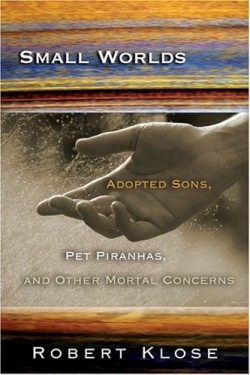Small Worlds
Adopted Sons, Pet Piranhas, and Other Mortal Concerns
Far from his home in Maine, a man shares his first night in a hotel room in the grim “worn to the bones” city of Moscow with a boy he has adopted from an orphanage. Under a midnight sun, the author finds “the beauty beyond the shadows” in the first glint of fatherhood.
Such is the thrust of this collection of personal essays that addresses the adaptability of human beings to new and different environments. Klose groups his book into eight sections according to themes such as surviving in a cold climate, teaching and learning from others, and raising two boys on his own. Topics range from the comical (learning the clarinet) to the sentimental (yearning for good old Converse sneakers), from the whimsical (turning river pumpkins into a legend) to the cultural (debating whether Maine has any).
This mix of reflections on his experiences reads like a rummage sale, where the reader can pick up the book, open it at random, and find something worth knowing or thinking about. Klose, associate professor of Biological Sciences at the University College of Bangor, wrote for twenty years for the Christian Science Monitor; his previous book is Adopting Alyosha: A Single Man Finds a Son in Russia.
The experience of fatherhood—of finding not one but two sons and adopting them—informs much of the book. He takes pride in their adjustment to “Maine’s backwaters” as well as his own as a child of the sixties from New Jersey. He also understands, as a teacher, that it’s the educator who becomes the educated. He is ready to learn from the experiences of others and to understand his own, whether it’s buying a piranha, learning Polish, or visiting Paris. The writing is assured, disciplined like the scientist Klose is, but also capable of poetic departures, as when he describes Maine as jutting into the Atlantic “like a balled fist” and Serbo-Croatian falling on the ear “like a driving hailstorm.”
By framing his commentary in the context of “mortal concerns,” Klose draws the reader into his orbit in this accessible and enjoyable collection. At times, the strict essay format doesn’t allow much in the way of in-depth exploration—it’s like scratching frost off a windowpane with a fingernail and getting a small glimpse of “the world beyond his own backyard.” The tone can also be overly nostalgic and the style old-fashioned (“wrest myself from the lure of errant thought”), but Klose manages to transfer some of the essence of Maine into these essays, much like the cold clear seawater he “reverentially” pours into fingerbowls for his lab students to examine for seaweed, as if he has prepared a feast for them.
Reviewed by
Trina Carter
Disclosure: This article is not an endorsement, but a review. The publisher of this book provided free copies of the book to have their book reviewed by a professional reviewer. No fee was paid by the publisher for this review. Foreword Reviews only recommends books that we love. Foreword Magazine, Inc. is disclosing this in accordance with the Federal Trade Commission’s 16 CFR, Part 255.

